Wall paintings in Belfast
Roy Kerridge Belfast Sandy Row, in Belfast, is now a ghost of its former self. Broken are the walls where King Billy, in painted splendour, fought the Battle of the Boyne. Where bright ornaments and maidenhair ferns stood proudly between net curtains, the windows are now filled in with ugly grey concrete blocks. Although condemned and evacuated, the houses are still there, with an occasional elderly couple in residence. The maze of terraces remains a strolling-ground for Belfast's Orange population. On the Saturday before the Boyne's anniversary, the shops are full of Union Jacks, King Bil- ly rosettes, maces for twirling, orange lilies and Orange records. The old songs are now more popular than ever, and new ones are being written, some in praise of the Ulster Volunteer Force. This is a para-military organisation to which many Orangemen give tacit approval.
Some weeks ago, I wandered along the Row searching for traditional wall pain- tings. In 1969, on my previous visit, every terrace had its larger-than-life mural of an idealised William on a white charger. Banishing the qualms of unease caused by occasional UVF slogans on walls, 1 now began to enjoy the holiday atmosphere. Carefree innocence, bonfire building and ice-cream licking seemed to be the order of the day. Cheeky young rogues in skinhead haircuts, the small boys of Sandy Row were busily building and guarding enormous bonfires. These would be set alight as the chimes of midnight ushered in the Twelfth of July.
Bonfire gangs abounded, all trying to steal wood from one another or set a rival's mountain of planks and tyres alight before the proper time. Huts were built alongside, and one or two boys stood guard all night. One hut I saw resembled a small house. It had real carpets inside, and boxes to sit on. A wall was missing, facing the bonfire. Numerous tales are told of boys who crawl- ed into the tall pyres and fell asleep on guard, to be burned alive.
'There used to be competitions in every street in the Row to see who had the cleanest step or the best decorated window,' my landlady told me. 'But nowadays people want a bath in every house and the young people are never happy unless everything is being pulled down around them.'
Shankill Road, rising steeply up from Peter's Hill, was bustling with shoppers. A nine-piece accordion band played in the Graveyard, the Shankill's main social cen- tre and pleasure ground. It is a real graveyard, which says much for the Orange temperament, an incongruous mixture of dour solemnity and lighthearted gaiety. A broken tombstone told the story of a man who had died while hurling a friend from the path of an assassin's bullet.
Outside the gates, stentorian.-voiced evangelists roared through loudspeakers on the eternal suffering of the damned in the fires of hell. Everyone listened with compla- cent enjoyment, but no one stepped for- ward to be 'saved'. They seemed to be look- ing forward to their fate.
All this was very enjoyable, of course, but I missed the painted house ends that are now a lost art of Protestant Belfast. Forswearing the comforts of the Elephant pub, with its high-backed conspirators' chairs, stale smells and cloth caps nodding over the racing results, I made my way to the Falls Road, the Catholic area. I had never been there before. When I was last in Belfast, names like 'Falls Road' and `Shankill' had not reached their present notoriety. Now, without the reassuring presence of the patrolling soldiers, I felt mildly apprehensive as I approached the Provos' stronghold. As in parts of Notting Hill and Bristol, attempts to keep the Falls Road peace are almost more trouble than they are worth. Nevertheless, the muralist's art flourishes there. Both paintings and painters are organised by the Junior Sinn Fein and similar bodies.
'Smash H-Block' appeared in huge white letters all over the grim grey flats that act as a gateway to Belfast's Republican quarter. Then just before council tenements and burned-out houses, destroyed by the army, gave way to terraced streets, I spied an enormous painting of Bernadette Devlin in triplicate. Each Bernadette, pink on a loud green background, was bawling with all her might and shaking a knobbly fist in the air. 'Have Strength, But Never Forget Tenderness' was the motto. From then on, paintings of every kind abounded, signed by the 'Broomfield Street Youth to Free the Blanketmen' and similar art societies. Perhaps the wild young men of each street had been formed into cells. Only these lounging young men looked menacing — everyone else seemed to be quiet and easy- going, the small girls bright in party dresses.
Many of the paintings were too alle- gorical for me to understand, or showed politicians with whom I was unfamiliar. Some displayed elaborate Gothic texts and showed the Virgin hovering above a dying hunger-striker or Christ looking down on a ragged wretch in a dungeon. As the blanketmen are punishing themselves in the cause of propaganda, the Saviour's reproachful expression seemed quite ap- propriate.
Despite these religious touches, the Falls Road atmosphere was intensely political, with communist slogans everywhere. When I saw a Catholic church, I felt instantly relieved, as the sacred statues outside offered a soothing contrast to the rough folk art of the angry streets.
Among the printed posters on' a roadside noticeboard was one issued by the Provos that showed a nondescript man wearing a suit superimposed over a soldier in uniform. 'Beware,' the caption read, 'This Brit Could Be the Man Standing Beside You. Loose Talk Costs Lives.'
'I'll drink to that,' I thought, and kept my mouth tightly shut.
Suddenly I received a terrible shock, for ahead of me stood a pillar box painted green! No greater symbol of Republican rule could be imagined, not even the Tricolour itself. South of the border this emerald fate has befallen all the pillar boxes. As I approached the People's Republic of Andersontown, at the top of the Falls Road, I noticed another pillar box in trouble. This one had been burnt out, and only a stump remained. Why do Irish Republicans pursue this insane vendetta against the Post Office? Perhaps it
represents British efficiency and order to them, in which case they are sadly out of date.
Andersontown, a council estate on the edge of Belfast, is approached by various bombed or demolished dwellings, and has 3 tall perimeter wall of sagging corrugated iron surmounted by a police observation post. My impression was that wall and Post were as much for the convenience and use of those inside as those out. A road check- point as I entered was unmanned, but 3 small, sealed-up army vehicle with a gun poking out of a narrow slit cruised cautiously up and down. It was a hot daY, and the only people I could see were a stout kindly-looking old man holding the hand of a little girl. I walked past all the street-corner pain- tings again, weaved in and out of the grey council flats and found the Catholic Pro- cathedral. In its cool, holy depths I sank in- to a reverie before the statue of a Virgin Mary with an electric neon-lit halo. The Orangemen should be cursing the Kremlin, not the Vatican, I decided. Writing a note to Dr Ian Paisley to this effect, I took a taxi to his house in Ballyhackamore and delivered it to his guard in person. The policeman seemed at first to think that I was going to shoot him. A very jumpy man.
Paisley lives among his people in Protes- tant East Belfast. Catholics in his North Antrim constituency claim that he treats them with the same consideration as those of his own faith. No one who wants to in- troduce life imprisonment for homosexuali- ty can be all bad, and I confess to a grow- ing, if perverse, admiration for Dr PaisleY. His grudge against the poor homosexuals, according to the Voice of Ulster magazine: is that they 'undermine the social order and high moral tone which exists in Northern Ireland'.
Walking down from Paisley's house to the city below me, I saw, at last, some Pro" testant wall paintings in the terraced streets. They were of Union Jacks only, together with the slogan 'One Queen, One Crown, No Pope In Our Town'. Bonfire boys waited expectantly for the witching hour, and in the East Belfast Constitutional Club a noisy dance was in progress. A boy chanted Orange songs in a jeering, defiant voice and looking round I saw to my horror the dreaded words 'Smash H-Block' again. A wire netting fence, broken down in places, surrounded the Catholic estate, or reserve. Small boys played among caver- nous ruins. Even if they brought it upon themselves, it seemed a pity that people should have to live like this.
Just as the bonfire boys, and the stories of their accidental deaths by fire, recall the pagan days of Ireland, so do the hunger strikers, urged to their doom by priests and relatives, represent the return of human sacrifice. Cathbad and Druid, the savag.e Irish version of Merlin, has worked Ins, spell. Instead of an island of saints, I fin° myself in W. B. Yeats's 'druid land', where prophets are obsessed with fire and walls are covered in primitive art.







































 Previous page
Previous page